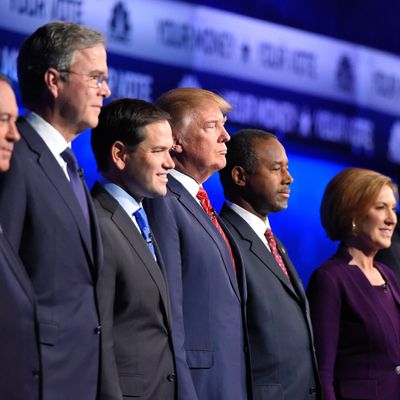
Just about anyone who has thought for a few moments about the giant Democratic presidential field that is currently assembling has probably wondered how it will affect candidate debates. Faced with a similar problem in 2016, Republicans devised a poll-based formula for participation in the first several debates. But since there were 17 (or a bit later, 16) candidates in the field, the networks sponsoring the debates divided them into two groups, with the top tier (ranging from 8 to 11 candidates) getting a spot in the main prime-time debate, and the remainder appearing in a prior (but little-watched) “undercard” or “kiddie table” debate.
As you can imagine, there was a lot of complaining about this arrangement from those left off the big stage. But it probably helped Republicans gradually winnow their enormous field into, well, Donald Trump and an assortment of candidates who were supposed to beat him.
Now Democrats are preparing for their first round of 2020 Democratic debates for June, to be sponsored by NBC News, MSNBC, and Telemundo. And with a field that could potentially include well over 20 candidates, the Democratic National Committee has had to face some of the same decisions Republicans encountered last time around. Perhaps because of residual bitterness from former and current Bernie Sanders supporters over the DNC’s role in minimizing the number of debates in 2016 — presumably in the interests of Establishment favorite Hillary Clinton — the party is taking a lighter hand this time around. So while there is a formula for getting on the stage, there’s no “kiddie table,” and if the field is really large, random rules for sorting out participation could lead to some rather interesting combinations:
Here’s NBC’s description of how it will work, based on the safe assumption that more than ten candidates will qualify for two debates on back-to-back weeknights:
[T]he lineups for each debate will be chosen at random, not strictly from how candidates are ranked in polls. To qualify, a candidate will need to either have at least 1 percent support in three qualifying polls, or provide evidence of at least $65,000 individual donations from a minimum of 200 different donors in at least 20 states.
If more than 20 candidates reach one of those two qualifications, the top 20 will be selected by using a separate method that rewards contenders for meeting both thresholds, followed by highest polling averages, and then the most unique donors.
While that would exclude some completely anonymous schmo from the debates, the threshold is not that high. More importantly, the random assignment of candidates to the two nights means there may not be the kind of interchanges among the truly viable candidates that debates are designed to produce.
What this means more strategically is that a gun-shy DNC has decided it won’t try to use the debate structure to winnow its crazy-large field. And if said field doesn’t get winnowed on its own, then the debates could be unwieldy free-for-alls for quite some time. We should all get used to that reality before yelling at the screen as John Delaney gets as much time and attention as Bernie Sanders.






























